gone with the wind 翻译赏析
诗歌赏析gone with the wind

节选自《飘》第13章第1段 (1)She silently watched him go up the stairs, feeling that she would strangle at the pain in her throat.
译文一:她默默地看着他走上楼去,只觉自己的 喉咙口梗着 一块辛酸, 几乎要把她闷煞. 译文二:她默默地望着他上楼,感到喉咙里痛得 厉害,仿佛要窒息死了. 译文三:她默默地看着他上楼去,但决喉头疼得 快憋死人了.
节选自《飘》第13章第1段 (1)She silently watched him go up the stairs, feeling that she would strangle at the pain in her throat.
译文一:她默默地看着他走上楼去,只觉自己的 喉咙口梗着 一块辛酸, 几乎要把她闷煞. 译文二:她默默地望着他上楼,感到喉咙里痛得 厉害,仿佛要窒息死了. 译文三:她默默地看着他上楼去,但决喉头疼得 快憋死人了.
TT1: 直到他的脚步声从楼上穿堂渐渐消失而去,她就 觉得世上万有皆空了。 TT2: 随着楼上穿堂里他的脚步声渐渐消失,她觉得这 世界上对她关系重大的 最后一个人也不复存在了 。 TT3: 他的脚步渐渐远去,消失在楼上过道里.,她最后 一线希望也随之而去。
三种译文虽然都注意了重复这一点,但我们认为对原句重 复句的表现还可以再进一步加强,即可以使用相同的词语, 不仅仅是含义相同的词-----达到原文想要表达的效果。所 以译文还可以略做调整:
随着他的脚步声在楼上过道里渐渐消失,她觉得世界上对 她关系重大的最后一个人也消失了。
(3)She
knew now that there was no appeal of emotion or reason which would turn that cool brain from its verdict.
Gone with the wind
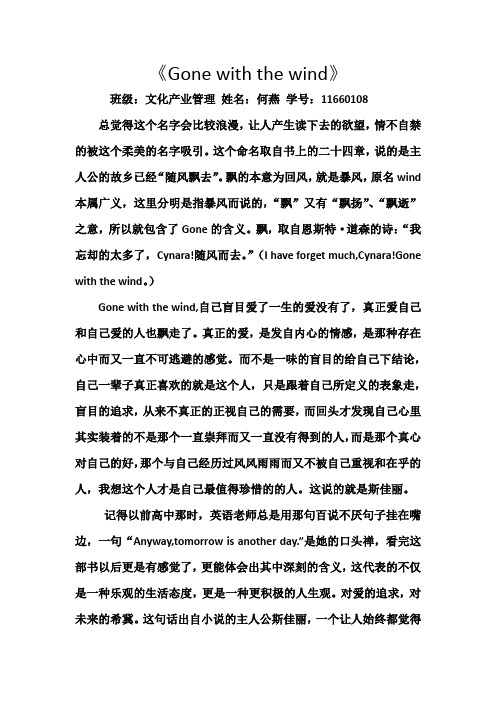
《Gone with the wind》班级:文化产业管理姓名:何燕学号:11660108总觉得这个名字会比较浪漫,让人产生读下去的欲望,情不自禁的被这个柔美的名字吸引。
这个命名取自书上的二十四章,说的是主人公的故乡已经“随风飘去”。
飘的本意为回风,就是暴风,原名wind 本属广义,这里分明是指暴风而说的,“飘”又有“飘扬”、“飘逝”之意,所以就包含了Gone的含义。
飘,取自恩斯特·道森的诗:“我忘却的太多了,Cynara!随风而去。
”(I have forget much,Cynara!Gone with the wind。
)Gone with the wind,自己盲目爱了一生的爱没有了,真正爱自己和自己爱的人也飘走了。
真正的爱,是发自内心的情感,是那种存在心中而又一直不可逃避的感觉。
而不是一味的盲目的给自己下结论,自己一辈子真正喜欢的就是这个人,只是跟着自己所定义的表象走,盲目的追求,从来不真正的正视自己的需要,而回头才发现自己心里其实装着的不是那个一直崇拜而又一直没有得到的人,而是那个真心对自己的好,那个与自己经历过风风雨雨而又不被自己重视和在乎的人,我想这个人才是自己最值得珍惜的的人。
这说的就是斯佳丽。
记得以前高中那时,英语老师总是用那句百说不厌句子挂在嘴边,一句“Anyway,tomorrow is another day.”是她的口头禅,看完这部书以后更是有感觉了,更能体会出其中深刻的含义,这代表的不仅是一种乐观的生活态度,更是一种更积极的人生观。
对爱的追求,对未来的希冀。
这句话出自小说的主人公斯佳丽,一个让人始终都觉得十分真实的人物。
无论何时从一开始到最后,她都是那么率真和现实,一心只为着自己利益,和她深爱的塔拉庄园。
感觉她这个形象就出现在你身边。
你有时觉得她很面熟,有时有觉得她很陌生,有时却要觉得她莫名其妙,有时你也很同情可怜她,然而最重要的一点就是觉得她很真实。
故事讲述的是在南北战争爆发前夕,佐治亚州一名叫塔拉的庄园。
GonewiththeWind四种汉译文

Gone with the wind《飘》电影欣赏中英

Gone with the wind
Gone with the wind
Gone with the wind
Time Released:1939
Country: USA
Running length:222min
Genre: Drama/ Romance/ War Author: Margaret Mitchell(玛格 丽特· 米切尔) Director :Victor Fleming(维克 多 费莱明)
作者简介
玛格丽特· 米切尔(1900-1949),美国现代
著名女作家。她生于亚特兰大市,曾获文学 博士学位,担任过《亚特兰大新闻报》的记 者。1937年她活的普利策奖。1939年获纽约 南方协会金质奖章。1949年,她不幸被车撞 死。她短暂的一生并未留下太多作品,但只 一部《飘》足以奠定她在世界文学史中不可 动摇的地位。
“明天是新的一天”,是最令我印象深刻的
一句话。我们应该珍惜现在所拥有的,因为 只有到最后我们才知道自己真正想要的是什 么什么。有太多人在失去后才懂得珍惜。如 果你在错过太阳时流泪,那么你也因此失去 了群星。当你经历了这些事后你要学会忽略 过去,因为明天又是新的一天
斯嘉丽是小说的主人公,她是杰拉德和埃
伦· 奥哈拉的女儿。无论是挑选衣服还是男孩, 她总有自己的选择。她总是在年轻男子中间 尽情的调情,其中包括其他女孩子的求爱者。 她是一个任性而且放纵的姑娘,但是智慧又 远远高于那些受过良好教德)
Scarlett’s third husband who is in love with her from the moment he sees her. He is opportunist willing to take advantage of any situation , but not without kindness or generosity under the right conditions.
gone with the wind讲解
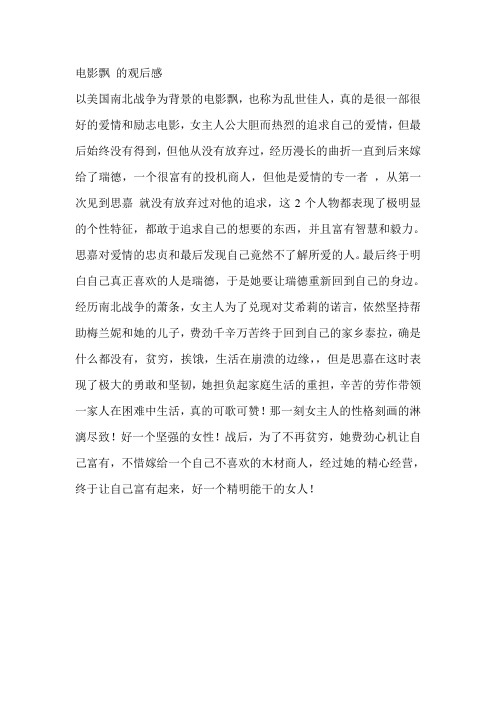
电影飘的观后感
以美国南北战争为背景的电影飘,也称为乱世佳人,真的是很一部很好的爱情和励志电影,女主人公大胆而热烈的追求自己的爱情,但最后始终没有得到,但他从没有放弃过,经历漫长的曲折一直到后来嫁给了瑞德,一个很富有的投机商人,但他是爱情的专一者,从第一次见到思嘉就没有放弃过对他的追求,这2个人物都表现了极明显的个性特征,都敢于追求自己的想要的东西,并且富有智慧和毅力。
思嘉对爱情的忠贞和最后发现自己竟然不了解所爱的人。
最后终于明白自己真正喜欢的人是瑞德,于是她要让瑞德重新回到自己的身边。
经历南北战争的萧条,女主人为了兑现对艾希莉的诺言,依然坚持帮助梅兰妮和她的儿子,费劲千辛万苦终于回到自己的家乡泰拉,确是什么都没有,贫穷,挨饿,生活在崩溃的边缘,,但是思嘉在这时表现了极大的勇敢和坚韧,她担负起家庭生活的重担,辛苦的劳作带领一家人在困难中生活,真的可歌可赞!那一刻女主人的性格刻画的淋漓尽致!好一个坚强的女性!战后,为了不再贫穷,她费劲心机让自己富有,不惜嫁给一个自己不喜欢的木材商人,经过她的精心经营,终于让自己富有起来,好一个精明能干的女人!。
gone with the wind译文对比赏析

gone with the wind译文对比赏析篇一: gone with the wind译文对比赏析i want to go with the wind, as if we were young as when the morn-sun was bright and the summer's buds of promise ripe。
今天,我要与微风一起走,好似青春年少时那般明亮的夏日,正是希望开始生长的季节。
两句诗均为名家之作,都是简洁而意蕴丰富的佳句,但在译文上却各有特色,各臻妙境,如何选择呢?下面就两首诗分别从情感色彩和语言艺术性等方面加以对比赏析。
(1)hi, i like i like it, but i do not think i will take it to its full significance。
i don’ t like it as a single wonder。
I can see the beautiful nature of the young garden。
The lush blooming flowers of spring are not in season。
i am very glad that they can not be admired in the quiet summer months。
I’m afraid they won’ t thrive in such hot and tiring summer climates。
The south wind is blowing too strong, so we may find it tiring, although the flowers seem to be smiling brightly。
“ i like”句译文为:我喜欢,我觉得它很美,不过我并不认为它会得到最大的意义。
Gone with the wind《飘》节选赏析
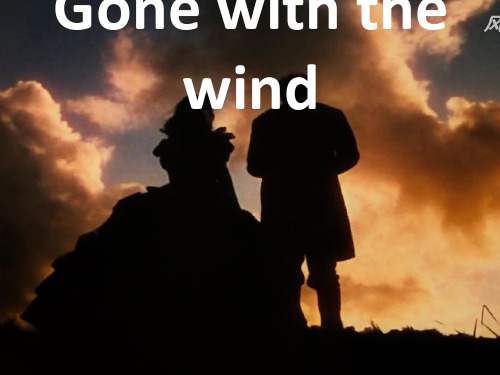
SCARLETT O’HARA was not beautiful, but men seldom realized it when caught by her charm as the Tarleton twins were.
思嘉·奥哈拉长得并不漂亮,但是男人们像 塔尔顿家那对孪生兄弟为她的魅力所迷住 时,就不会这样想了。
Above them, her thick black brows slanted upward, cutting a startling oblique line in hermagnolia -white skin—that skin so prized by Southern women and so carefully guarded withbonnets , veils and mittens against hot Georgia suns. 上面是两条墨黑的浓眉斜在那里,给她木兰花 般白皙的肌肤划上十分分明的斜线,这样白皙 的皮肤对南方妇女是极其珍贵的。她们常常用 帽子、面纱和手套把皮肤保护起来,以防受到 佐治亚炎热太阳的暴晒。
4.hazel ['heizl] n. 榛, 淡褐色 This small animal has a pair of hazel eyes. 这只小动物有一双淡褐色的眼睛。 5.bristly adj. 1. (毛发)短而硬的2. 长满刚毛; 粗糙的3. 林立的4. 易怒的 She finds his beard too bristly. 她觉得他的胡须太扎人。
2.In her face were too sharply blended the delicate features of her mother, a Coast aristocrat of French descent, and the heavy ones of her florid Irish father. 【难句解析】这句话相当于her face blends the delicate features and the heavy ones... 【句子译文】她脸上有着两种特征,一 种是她母亲的娇柔,来自法兰西血统 的海滨贵族;一种是她父亲的粗犷。
Gone with the Wind中译文赏析

Gone with the Wind中译文赏析摘要:Gone with the Wind 是美国著名女作家玛格丽特·米歇尔所著,一部带着伤感怀旧情怀的小说。
它以南北战争为背景,重点刻画了一位外表迷人、内心冷酷、性格坚强、头脑精明、命运坎坷的南方佳人的典型艺术形象。
其艺术表达方面造诣很高,书中棱角分明的人物和由于主人公之间各自不同的性格和道德观造成的巨大差别,使得小说跌宕起伏,引人入胜。
该小说至今已有多个译本出现,比较著名的有傅东华先生,陈廷良先生,以及戴侃、李野光先生的译本。
本文拟翻译策略、语言风格等方面对这三个译本的第一章开头两个自然段进行对比赏析。
关键词:小说;翻译策略;语言风格1. 从翻译策略上看小说开头两个自然段,其内容是通过对女主人公——Scarlet O’Hara的外貌以及穿着打扮等细节描写,其中对眼睛的重彩刻画暗示了她不规矩、大胆任性的性格特征,为人物的进一步描写及故事情节的展开做铺垫。
因此对这两段意思的传达是非常重要的,逐字逐句的翻译很难达到好的效果。
1)归化和异化归化是傅译最显著的特征,戴、李译属于异化。
比如第一自然段中“her thick black brows”傅译成“两撇墨墨的娥眉”,第二自然段中“new green flowered-muslin dress”译成“新制的绿色花布春衫”。
“娥眉”和“春衫”一词都具有很浓的中国色彩。
这两个短语在陈译和戴、李译中分别是“两道又浓又黑的剑眉”和“绿花布的新衣”(陈译),“两撇墨黑的浓眉”和“新做的绿花布衣裳”。
陈译“剑眉”也是归化译法,具中国色彩。
总体上看,傅译中的描写有个人想象的因素在里面,描写的更生动一些,中国读者能根据描述在脑海中形成符合中国人审美习惯的魅力佳人形象,不过让人感觉是“中国佳人”而不是“美国佳人”。
2)分句三个译文都用到了分句的翻译策略,这是由于中英文句型结构和思维及语言习惯不同所致。
“Her new green flowered-muslin dress spread its twelve yards of billowing material over her hoops and exactly matched the flat-heeled green morocco slippers her father and recently brought her from Atlanta.”这是原文第二自然段中间没有标点符号的一个复合长句。
gone with the wind 飘 中英文双语介绍

Gone with the WindPlot summaryGone with the Wind takes place in the southern United States in the state of Georgia during the American Civil War (1861–1865) and the Reconstruction Era (1865–1877) that followed the war. The novel unfolds against the backdrop of rebellion wherein seven southern states, Georgia among them, have declared their secession from the United States (the "Union") and formed the Confederate States of America (the "Confederacy"), after Abraham Lincoln was elected president with no ballots from ten Southern states where slavery was legal. A dispute over states' rights has arisen[60] involving enslaved African people who were the source of manual labor on cotton plantations throughout the South. The story opens in April 1861 at the "Tara" plantation, which is owned by a wealthy Irish immigrant family, the O'Haras. The reader is told Scarlett O'Hara, the sixteen-year-old daughter of Gerald and Ellen O'Hara, "was not beautiful, but"[54] had an effect on men, especially when she took notice of them. It is the day before the men are called to war, Fort Sumter having been fired on two days earlier.There are brief but vivid descriptions of the South as it began and grew, with backgrounds of the main characters: the stylish and highbrow French, the gentlemanly English, the forced-to-flee and looked-down-upon Irish. Miss Scarlett learns that one of her many beaux, Ashley Wilkes, is soon to be engaged to his cousin, Melanie Hamilton. She is stricken at heart. The following day at the Wilkeses' barbecue at "Twelve Oaks," Scarlett informs Ashley she loves him and Ashley admits he cares for her.[60] However, he knows he would not be happily married to Scarlett because of their personality differences. Scarlett loses her temper at Ashley and he silently takes it.Then Scarlett meets Rhett Butler, a man who has a reputation as a rogue. Rhett had been alone in the library when Ashley and Scarlett entered, and felt it wiser to not make his presence known while the argument took place. Rhett applauds Scarlett for the unladylike spirit she displayed with Ashley. Infuriated and humiliated, Scarlett tells Rhett, "You aren't fit to wipe Ashley's boots!"[60]Upon leaving the library and rejoining the other party guests, she finds out that war has been declared and the men are going to enlist. Seeking revenge for being jilted by Ashley, Scarlett accepts a proposal of marriage from Melanie's brother, Charles Hamilton. They marry two weeks later. Charles dies from measles two months after the war begins. Scarlett is pregnant with her first child. A widow at merely sixteen, she gives birth to a boy, Wade Hampton Hamilton, named after his father's general.[61] As a widow, she is bound by tradition to wear black and avoid conversation with young men. Scarlett is despondent as a result of the restrictions placed upon her.Melanie, who is living in Atlanta with Aunt Pittypat, invites Scarlett to live with them. In Atlanta, Scarlett's spirits revive and she is busy with hospital work and sewing circles for the Confederate army. Scarlett encounters Rhett Butler again at a dance for the Confederacy. Although Rhett believes the war is a lost cause, he is blockade running for the profit in it. The men must bid for a dance with a lady and Rhett bids "one hundred fifty dollars-in gold"[37] for a dance with Scarlett.Everyone at the dance is shocked that Rhett would bid for Scarlett, the widow still dressed in black. Melanie smooths things over by coming to Rhett's defense because he is generously supporting the Confederate cause for which her husband, Ashley, is fighting.At Christmas (1863), Ashley has been granted a furlough from the army and returns to Atlanta to be with Melanie. The war is going badly for the Confederacy. Atlanta is under siege (September 1864), "hemmed in on three sides,"[62] it descends into a desperate state while hundreds of wounded Confederate soldiers lie dying or dead in the city. Melanie goes into labor with only the inexperienced Scarlett to assist, as all the doctors are busy attending the soldiers. Prissy, a young Negro servant girl, cries out in despair and fear, "De Yankees is comin!"[63] In the chaos, Scarlett, left to fend for herself, cries for the comfort and safety of her mother and Tara. The tattered Confederate States Army sets flame to Atlanta as they abandon it to the Union Army.Melanie gives birth to a boy named Beauregard, and now they must hurry for refuge. Scarlett tells Prissy to go find Rhett, but she is afraid to "go runnin' roun' in de dahk". Scarlett replies to Prissy, "Haven't you any gumption?"[63] Prissy then finds Rhett, and Scarlett begs him to take herself, Wade, Melanie, Beau, and Prissy to Tara. Rhett laughs at the idea, but steals an emaciated horse and a small wagon, and they follow the retreating army out of Atlanta.Part way to Tara, Rhett has a change of heart and he abandons Scarlett to enlist in the army. Scarlett makes her way to Tara without him where she is welcomed on the steps by her father, Gerald. It is clear things have drastically changed: Gerald has lost his mind, Scarlett's mother is dead, her sisters are sick with typhoid fever, the field slaves left after Emancipation, the Yankees have burned all the cotton and there is no food in the house.The long tiring struggle for post-war survival begins that has Scarlett working in the fields. There are so many hungry people to feed and so little food. There is the ever present threat of the Yankees who steal and burn, and at one point, Scarlett kills a Yankee marauder with a single shot from Charles's pistol leaving "a bloody pit where the nose had been."[64]A long succession of Confederate soldiers returning home stop at Tara to find food and rest. Two men stay on, an invalid Cracker, Will Benteen, and Ashley Wilkes, whose spirit is broken. Life at Tara slowly begins to recover when a new threat appears in the form of new taxes on Tara.Scarlett knows only one man who has enough money to help her pay the taxes, Rhett Butler. She goes to Atlanta to find him only to learn Rhett is in jail. As she is leaving the jailhouse, Scarlett runs into Frank Kennedy, who is betrothed to Scarlett's sister, Suellen, and running a store in Atlanta. Soon realizing Frank also has money, Scarlett hatches a plot and tells Frank that Suellen has changed her mind about marrying him. Thereafter Frank succumbs to Scarlett's feminine charms and he marries her two weeks later knowing he has done "something romantic and exciting for the first time in his life."[65] Always wanting Scarlett to be happy and radiant, Frank gives her the money to pay the taxes on Tara.While Frank has a cold and is being pampered by Aunt Pittypat, Scarlett goes over the accounts atFrank's store and finds many of his friends owe him money. Scarlett is now terrified about the taxes and decides money, a lot of it, is needed. She takes control of his business while he is away and her business practices leave many Atlantans resentful of her. Then with a loan from Rhett she buys a sawmill and runs the lumber business herself, all very unladylike conduct. Much to Frank's relief, Scarlett learns she is pregnant, which curtails her activities for awhile. She convinces Ashley to come to Atlanta and manage the mill, all the while still in love with him. At Melanie's urging, Ashley takes the job at the mill. Melanie soon becomes the center of Atlanta society, and Scarlett gives birth to a girl named Ella Lorena. "Ella for her grandmother Ellen, and Lorena because it was the most fashionable name of the day for girls."[66]The state of Georgia is under martial law and life there has taken on a new and more frightening tone. For protection, Scarlett keeps Frank's pistol tucked in the upholstery of the buggy. Her trips alone to and from the mill take her past a shanty town where criminal elements live. On one evening when she is coming home from the mill, Scarlett is accosted by two men who attempt to rob her, but she escapes with the help of Big Sam, the former negro foreman from Tara. Attempting to avenge the assault on his wife, Frank and the Ku Klux Klan raid the shanty town whereupon Frank is shot dead. Scarlett is a widow for a second time.Rhett puts on a charade to keep the men who participated in the shanty town raid from being arrested. He walks into the Wilkeses' home with Hugh Elsing and Ashley, singing and pretending to be drunk. Yankee officers outside the home question Rhett and he tells them he and the other men had been at Belle Watling's brothel that evening, a story Belle later confirms to the officers. The men are indebted to Rhett for saving them, and his Scallawag reputation among them improves a notch, but the men's wives, with the exception of Melanie, are livid at owing their husbands' lives to Belle Watling.Frank Kennedy lies cold in a coffin in the quiet stillness of the parlor in Aunt Pittypat's home. Scarlett is in a remorseful state. She is swigging brandy from Aunt Pitty's swoon bottle when Rhett comes to call. She tells Rhett tearfully, "I'm afraid I'll die and go to hell," to which Rhett replies, "Maybe there isn't a hell."[19] Before she can cry any further, Rhett asks Scarlett to marry him saying, "I always intended having you, one way or another."[19] Scarlett declares she doesn't love him and doesn't want to be married again. However, Rhett kisses her passionately, and in the heat of the moment she agrees to marry him. One year later, Scarlett and Rhett announce their engagement.News of the impending marriage is the talk of the town. Mr. and Mrs. Butler honeymoon in New Orleans, spending lavishly. Upon their return to Atlanta, the couple take up residence in the bridal suite at the National Hotel while their new home on Peachtree Street is being constructed. Scarlett chooses a modern Swiss chalet style home like the one she saw in Harper's Weekly, and red wallpaper, thick red carpet and black walnut furniture for the interior. Rhett describes the house as an "architectural horror".[67] Shortly after the Butlers move into their new home, the sardonic jabs between them turn into full-blown quarrels. Scarlett wonders why Rhett married her. Then "with real hate in her eyes"[67] she tells Rhett she is going to have a baby, a baby she does not want.Wade is seven years old in 1869 when his sister, Eugenie Victoria, named after two queens, arrives in the world. She has blue eyes like Gerald O'Hara and Melanie gives her the nickname, "Bonnie Blue," in reference to the Bonnie Blue Flag of the Confederacy.When Scarlett is feeling well again, she makes a trip to the mill and talks to Ashley, who is alone in the office. In the conversation with him, she comes away believing Ashley still loves her and is jealous of her intimate relations with Rhett, which excites her. Scarlett returns home and tells Rhett she does not want more children. From then on, Scarlett and Rhett sleep in separate bedrooms, and when Bonnie is two years old, she sleeps in a little bed beside Rhett's bed (with the light on all night long because she is afraid of the dark). Rhett turns his attention towards Bonnie, dotes on her, spoils her, and worries about her reputation when she is older.Melanie is giving a surprise birthday party for Ashley. Scarlett goes to the mill to keep Ashley there until party time, a rare opportunity for Scarlett to see Ashley alone. When she sees him, she feels "sixteen again, a little breathless and excited."[68] Ashley tells her how pretty she looks, and they reminisce about the days when they were young and talk about their lives now. Suddenly Scarlett's eyes fill with tears and Ashley holds her head against his chest. Then in the doorway of the office Ashley sees standing his sister, India Wilkes. Before the party has even begun rumors of an adulterous relationship between Ashley and Scarlett have started, and Rhett and Melanie have heard the gossip. Melanie refuses to accept any criticism of her sister in-law and India Wilkes is banished from the Wilkeses' home for it, causing a rift in the family.Rhett, more drunk than Scarlett has ever seen him, returns home the evening of the party long after Scarlett. His eyes are bloodshot and his mood is dark and violent. He enjoins Scarlett to drink with him. Not wanting Rhett to know she is fearful of him, Scarlett throws back a drink and gets up from her chair to go back to her bedroom. But Rhett stops her and pins her shoulders to the wall. Scarlett tells Rhett he is jealous of Ashley and Rhett accuses Scarlett of "crying for the moon"[53] over Ashley. He tells Scarlett they could have been happy together saying, "for I loved you and I know you."[53] Rhett then takes Scarlett in his arms and carries her up the stairs to her bedroom where passion envelops them.The following morning Rhett leaves town with Bonnie and Prissy and stays away for three months. Scarlett finds herself missing him, but she is still unsure if Rhett loves her, having told her so when he was drunk. She learns she is pregnant with her fourth child.On the day Rhett arrives home, Scarlett waits for him at the top of the stairs. She wonders if Rhett will kiss her, but to Scarlett's irritation, he does not. He tells her she looks pale. Scarlett tells him she is pale because she is pregnant. Rhett sarcastically asks her if the father is Ashley. She calls Rhett a cad and tells him no woman would want a baby of his. To which Rhett responds, "cheer up, maybe you'll have a miscarriage."[69] At that comment, Scarlett lunges at Rhett, but he side steps and she tumbles backwards down the stairs. She is seriously ill for the first time in her life, having lost her child and broken her ribs. Rhett is remorseful, believing he has killed her. Sobbing and drunk, Rhett buries his head in Melanie's lap and confesses he had been a jealouscad.Scarlett, who is thin and pale, goes to Tara taking Wade and Ella with her, to regain her strength and vitality from "the green cotton fields of home."[70] When she returns a healthy woman to Atlanta, she sells the mills to Ashley. She finds Rhett's attitude has noticeably changed. He is sober, kinder, polite and seemingly disinterested. Though she misses the old Rhett at times, Scarlett is content to leave well enough alone.Now Bonnie is four years old in 1873. A spirited and willful child, she has her father wrapped around her finger and giving into her every demand. Even Scarlett is jealous of the attention she gets from him. Rhett rides his horse around town with Bonnie in front of him, but the household mammy, "Mammy," insists it is not fitting for a girl to ride a horse with her dress flying up. Rhett heeds Mammy's words and buys Bonnie a Shetland pony, whom she names "Mr. Butler," and teaches her to ride sidesaddle. Then Rhett pays a boy named Wash twenty-five cents to teach Mr. Butler to jump over wood bars. When Mr. Butler is able to get his fat legs over a one foot high bar, Rhett puts Bonnie on the pony, and soon Mr. Butler is leaping bars and Aunt Melly's rose bushes.Wearing her blue velvet riding habit with a red feather in her black hat, Bonnie pleads with her father to raise the bar to one and a half feet. He gives in and raises the bar, warning her not to come crying to him if she falls. Bonnie yells to her Mother, "Watch me take this one!"[71] The pony gallops towards the wood bar, but trips over it splintering the wood. Mr. Butler tumbles to the ground then scrambles to his feet and trots off with an empty saddle. Little Miss "Bonnie Blue" Butler is dead.In the dark days and months following Bonnie's death, Rhett is often drunk and disheveled, while Scarlett, though deeply grieved also, seems to hold up under the strain. With the untimely death of Melanie Wilkes a short time later, Rhett decides he only wants the calm dignity of the genial South he once knew in his youth and he leaves Atlanta to find it. Meanwhile, Scarlett dreams of love that has eluded her for so long. However, she still has Tara and is determined to win Rhett back, and "tomorrow is another day.此书名取自恩斯特·道森的诗《sum qualís eram bonae sub regno Cynarae》第三段第一句: "我忘却的太多了,Cynara!随风而去."(原文:I have forgot much, Cynara! gone with the wind).书名的也同样在小说中出现:当思嘉丽为躲避北方军对亚特兰大的轰击,逃回她家族的农场,塔拉.有一个瞬间,她想到:"塔拉还在吗?抑或是它已经随着席卷佐治亚州的风暴而去了呢?"(Was Tara still standing? Or was Tara also gone with the wind which had swept through Georgia?"1861年4月,美国南北两方的关系已经非常紧张。
gone_with_the_wind
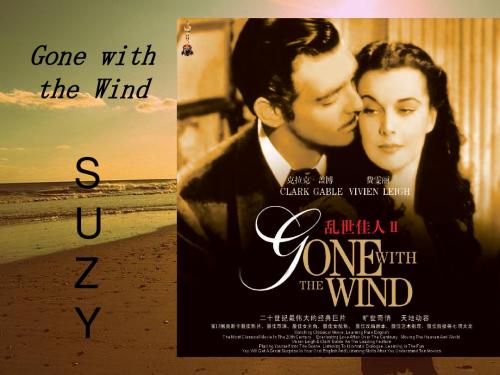
Tomorrow is another day!
Thank
You!
爱情是电影永恒的题材,正如片名一样,《乱世佳人》(Gone With The Wind)暗示着18世纪中叶美国南方文化的随风而去,暗示着新的时代的 来临。这不是一部纯粹的爱情影片,我更愿称它为史诗片,动荡的年代,对 爱情的狂热追求,主人公在困难与挫折前所表现出的勇气与奋斗不息的精神 着实感动了人们 。《乱世佳人》生动地再现了南部种植园经济由兴盛到崩溃、 奴隶主生活由骄奢淫逸到穷途末路、奴隶制经济为资本主义经济所取代的社 会变革。以“乱世佳人”斯嘉丽为主线,描写了几对青年的爱情纠葛。女主 角斯嘉丽年轻貌美,但她的所作所为显示了没落奴隶主阶级的某些本质特征: 残酷、贪婪、自信,为了自己和庄园的利益可以把爱情和婚姻作为交易。但 同时斯嘉丽又是勇敢、坚强,对爱情有着火一样的狂野。我想这正是吸引瑞 德的地方。而男主角瑞德,则是放荡不羁、玩世不恭,豪迈却时而透露着绅 士风度。不同于平常爱情的爱情,注定会让人难忘。一个像风一样飘乎不定 没有根的男人却深爱着一个自信残酷贪婪的女人,只有如此才能证实爱情的 伟大 。两个相像的人,都是生活中的强者,却还想做感情中的强者,这是行 不通的。爱不需要蛮横,也是不能蛮横的。瓜熟蒂落,水到渠成,如同生命 一般自然,飘来飘去的才是爱情。永恒的爱情蕴藏于宏大的战争中,《乱世 佳人》也着实成了世界影迷心中永远的纪念和美好的回忆 。
斯坦纳在谱曲
《乱世佳人》经典对白欣赏
I wish I could be more like you. 我要像你一样就好了。 Whatever comes, I'll love you, just as I do now. Until I die. 无论发生什么事,我都会像现在一样爱你,直到永远 In spite of you and me and the whole silly world going to pieces around us, I love you. 哪怕是世界末日我都会爱着你。 Now I find myself in a world which for me is worse than death. A world in which there is no place for me. 现在我发现自己活在一个比死还要痛苦的世界,一个无我容身之 处的世界。
2 Gone with the Wind 四种汉译文

1861年4月的一个下午,春光明媚,斯佳丽同斯图尔特和布伦特一道坐在她父亲的农场——塔拉农场——门廊的阴凉处,她那模样宛如画中美人。她身着一件新的绿色花棉布连衣裙,波浪形的裙幅达十二码,从裙箍处飘泻下来,这与她父亲最近从亚特兰大给她买回的绿色平跟摩洛哥皮拖鞋刚好相配。她腰身十七英寸,在几个县里都算最细小的。连衣裙把她的腰肢衬托得美妙绝伦。她的上衣紧贴着身子,虽然只有十六岁,可她那对乳房已经发育得非常成熟。尽管她穿着舒展的裙子,显得非常朴实;尽管她用发网将头发顺溜地拢进发髻中,显得非常端庄,尽管她将洁白的小手交叉着十指放在膝上,显得非常文静,但她的本性却几乎无法被掩盖住。从脸看上,她非常贤淑,可那双绿色的眼睛却显示出她躁动不安、固执任性、充满活力,这与她那万千的仪态显然格格不入。她那优雅的举止是由于母亲循循善诱,还有那黑人嬷嬷的严加管教才好不容易形成的,可她的那双眼睛折射出了她的心灵。(李明译)
飘

小组成员:
》
吴小华:20110511998 蒲 斌:20110511999 冯 俊:20110512000 黄 欢:20110512001 徐 琼:20110512002 李凤娜:20110512003 魏 涛:20110512004
Gone with the Wind 的含义
Gone with the Wind 的真正含义是:虽然旧日的 种种已经逝去,但只要有不畏困难的勇气和决 心,明天又会是崭新的一天。如果用“乱世佳 人”来作书名,容易给人误导,好像这本书写 的只是一个美貌佳人的传奇经历,没有很好地 衬托出该书深刻的时代背景。而“飘”看似简 单却并不单纯指主人公因任性而使爱情随风逝 去,也指主人公的家园因战争的破坏而随风飘 去,更是指主人公所在的南方代表的旧的社会 制度被暴风wind带走,一去不复返了。
-----the first paragraph of Chapter 1 SCARLETT O’HARA was not beautiful, but men seldom realized it when caught by her charm as the Tarleton twins were. In her face were too sharply blended the delicate features of her mother, a Coast aristocrat of French descent, and the heavy ones of her florid Irish father. But it was an arresting face, pointed of chin, square of jaw. Her eyes were pale green without a touch of hazel, starred with bristly black lashes and slightly tilted at the ends. Above them, her thick black brows slanted upward, cutting a startling oblique line in her magnolia-white skin—that skin so prized by Southern women and so carefully guarded with bonnets, veils and mittens against hot Georgia suns.
Gone with the wind 乱世佳人
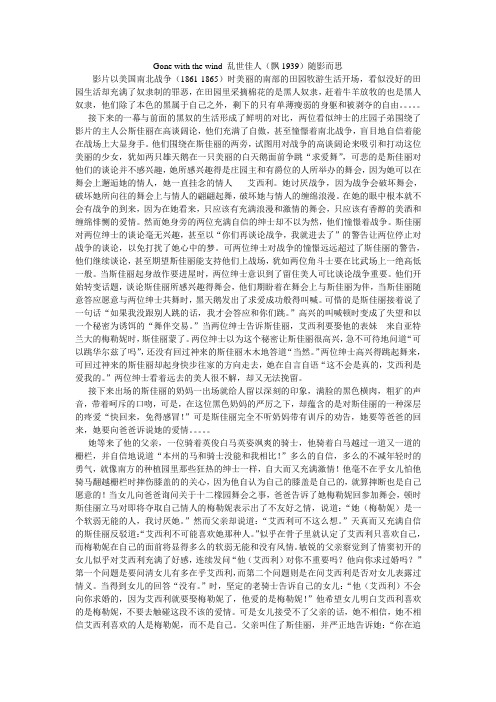
Gone with the wind 乱世佳人(飘1939)随影而思影片以美国南北战争(1861-1865)时美丽的南部的田园牧游生活开场,看似没好的田园生活却充满了奴隶制的罪恶,在田园里采摘棉花的是黑人奴隶,赶着牛羊放牧的也是黑人奴隶,他们除了本色的黑属于自己之外,剩下的只有单薄瘦弱的身躯和被剥夺的自由。
接下来的一幕与前面的黑奴的生活形成了鲜明的对比,两位看似绅士的庄园子弟围绕了影片的主人公斯佳丽在高谈阔论,他们充满了自傲,甚至憧憬着南北战争,盲目地自信着能在战场上大显身手。
他们围绕在斯佳丽的两旁,试图用对战争的高谈阔论来吸引和打动这位美丽的少女,犹如两只雄天鹅在一只美丽的白天鹅面前争跳“求爱舞”,可悲的是斯佳丽对他们的谈论并不感兴趣,她所感兴趣得是庄园主和有爵位的人所举办的舞会,因为她可以在舞会上邂逅她的情人,她一直挂念的情人-----艾西利。
她讨厌战争,因为战争会破坏舞会,破坏她所向往的舞会上与情人的翩翩起舞,破坏她与情人的缠绵浪漫。
在她的眼中根本就不会有战争的到来,因为在她看来,只应该有充满浪漫和激情的舞会,只应该有香醇的美酒和缠绵悱恻的爱情。
然而她身旁的两位充满自信的绅士却不以为然,他们憧憬着战争。
斯佳丽对两位绅士的谈论毫无兴趣,甚至以“你们再谈论战争,我就进去了”的警告让两位停止对战争的谈论,以免打扰了她心中的梦。
可两位绅士对战争的憧憬远远超过了斯佳丽的警告,他们继续谈论,甚至期望斯佳丽能支持他们上战场,犹如两位角斗士要在比武场上一绝高低一般。
当斯佳丽起身故作要进屋时,两位绅士意识到了留住美人可比谈论战争重要。
他们开始转变话题,谈论斯佳丽所感兴趣得舞会,他们期盼着在舞会上与斯佳丽为伴,当斯佳丽随意答应愿意与两位绅士共舞时,黑天鹅发出了求爱成功般得叫喊。
可惜的是斯佳丽接着说了一句话“如果我没跟别人跳的话,我才会答应和你们跳。
”高兴的叫喊顿时变成了失望和以一个秘密为诱饵的“舞伴交易。
”当两位绅士告诉斯佳丽,艾西利要娶他的表妹---来自亚特兰大的梅勒妮时,斯佳丽蒙了。
Gone with the Wind中文译本的比较分析

Gone With the Wind中文译本的比较分析【摘要】Gone with the Wind作为美国女作家玛格丽特·米切尔(Margaret Mitchell)一生唯一的作品,却一举成为了举足轻重的世界名著,这种现象在英美文学史上是极为少见的。
米切尔通过对女主人公Scarlett O’Hara生活及爱情经历的描写与刻画,成功反映了19 世纪中叶美国南北战争和战后重建时期的社会变革和发展情况。
它不光是一本以爱情为主题的小说,更是一部集战争、社会变革、女性蜕变为一体的巨著。
而最早将此巨著带来中国的,是著名翻译家傅东华先生。
上海被日本侵略军占领后,1937年,傅先生开始翻译Gone with the Wind,并将标题译为《飘》。
因此,1940年所出版的《飘》是Gone with the Wind在中国最早的译本,也是傅东华先生第一次赋予女主人公郝思嘉这个中文名字1。
与傅先生相比起来,另一位译者就要年轻太多了。
70年后,厦门大学外文学院的李美华教授重新开始翻译这本小说。
李美华从1997年年底开始翻译,2000年初交稿,耗时整整2年2。
本文主要从译文分析和原因分析着手,译本分析寻找两个译本间的差异,再来分析造成这些差异的原因。
【正文】对译本的分析不仅是重新解读原著的过程,更是重塑故事的过程。
译本分析的第一个层面主要集中在对翻译技法使用的探索上。
通过阅读译本,最能引起读者注意的要数异化与归化在文中的运用。
傅东华将原文中的地名、人名都赋予了中国的命名习俗及其特定意义。
郝思嘉在战争中从亚特兰大逃回家乡塔拉,似乎就像是从一块荒乱危险的不毛之地逃到了安全的避风港,“饿狼陀”、“陶乐”二词,似乎就隐含了这层强烈的对比意义,此外“陶乐”二字,似乎蕴含了一片乐土,陶然居之的韵味,与中国文化中“家”的意向不谋而合。
要再仔细想想其中的韵味,“癞痢村”便是一个更妙的例子。
在英语语音修辞手段中,押头韵是一种非常重要的修辞手法,即1傅东华,《飘》,浙江,浙江人民出版社,1979.2李美华,《飘》,南京,译林出版社,2000.在两个单词或两个单词以上的词组中,每个单词开首单个辅音、开首元音、字母、辅音连缀的重复3。
《飘》(节选)三种译作之比较及赏析
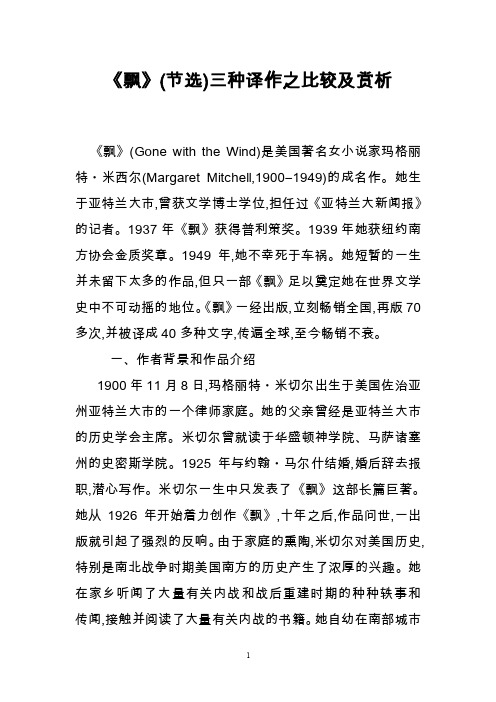
《飘》(节选)三种译作之比较及赏析《飘》(Gone with the Wind)是美国著名女小说家玛格丽特・米西尔(Margaret Mitchell,1900―1949)的成名作。
她生于亚特兰大市,曾获文学博士学位,担任过《亚特兰大新闻报》的记者。
1937年《飘》获得普利策奖。
1939年她获纽约南方协会金质奖章。
1949年,她不幸死于车祸。
她短暂的一生并未留下太多的作品,但只一部《飘》足以奠定她在世界文学史中不可动摇的地位。
《飘》一经出版,立刻畅销全国,再版70多次,并被译成40多种文字,传遍全球,至今畅销不衰。
一、作者背景和作品介绍1900年11月8日,玛格丽特・米切尔出生于美国佐治亚州亚特兰大市的一个律师家庭。
她的父亲曾经是亚特兰大市的历史学会主席。
米切尔曾就读于华盛顿神学院、马萨诸塞州的史密斯学院。
1925年与约翰・马尔什结婚,婚后辞去报职,潜心写作。
米切尔一生中只发表了《飘》这部长篇巨著。
她从1926年开始着力创作《飘》,十年之后,作品问世,一出版就引起了强烈的反响。
由于家庭的熏陶,米切尔对美国历史,特别是南北战争时期美国南方的历史产生了浓厚的兴趣。
她在家乡听闻了大量有关内战和战后重建时期的种种轶事和传闻,接触并阅读了大量有关内战的书籍。
她自幼在南部城市亚特兰大成长,耳濡目染了美国南方的风土人情,这里的自然环境和社会环境成了米切尔文思纵横驰骋的背景和创作的源泉。
当26岁的玛格丽特决定创作一部有关南北战争的小说时,亚特兰大自然就成了小说的背景。
《飘》是一部描写爱情的小说。
这本书以美国南北战争时期的南方社会为背景,以郝思嘉为主线,描写了几对青年的爱情纠葛。
作者站在同情农奴主的立场上,描写了美国南北战争和战后重建的情况,情节生动、笔调幽默,具有南方浪漫传奇小说的传统。
米切尔以她女性的细腻,精确地把握了人物复杂的心理活动,成功地塑造了郝思嘉这一复杂的人物形象。
小说的构思极富浪漫情调,人物和场景的描写细腻生动,语言优美生动,对白个性化,使得整部作品极具魅力。
体现“信”“达”“雅”英汉翻译三则

____________________________________________
三段】Years may wrinkle the skin, but to give up enthusiasm wrinkles the soul. Worry, fear, self-distrust bows the heart and turns the spirit back to dust.
"达":(网民版)比赛第一名:20年前虽相知不多,但心有灵犀,你让我为之倾倒。当步入婚姻殿 堂,阿瓦尼雪花飞舞,似为我们庆祝。转眼间,生儿添女,有苦有乐,但无怨无悔。平日相敬 如宾,我们的爱日久弥新。一切之后,重温20年前故地,虽满脸皱纹,心历沧桑,但你我都更 为成熟睿智。如今已然明白了生活中的苦乐、真谛与奇妙,我们依然相濡以沫,携手同行。我 也一直漫步在爱的云端,不想坠落尘寰。
____________________________________________
【第五段】When your aerials are down, and your spirit is covered with snows of cynicism and the ice of pessimism, then you’ve grown old, even at 20; but as long as your aerials are up, to catch waves of optimism, there’s hope you may die young at 80.
____________________________________________
【第二段】Youth means a temperamental predominance of courage over timidity, of the appetite for adventure over the love of ease. This often exists in a man of 60 more than a boy of 20. Nobody grows old merely by a number of years. We grow old by deserting our ideals.
(乱世佳人)Gone with the Wind 英文介绍及赏析
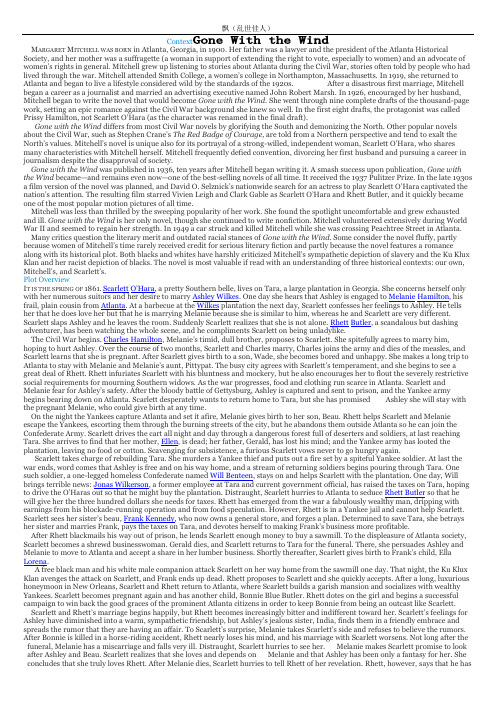
Gone with the Winddiffers from most Civil War novels by glorifying the South and demonizing the North. Other popular novels about the Civil War, such as Stephen Crane’sThe Red Badge of Courage,are told from a Northern perspective and tend to exalt the North’s values. Mitchell’s novel is unique also for its portrayal of a strong-willed, independent woman, Scarlett O’Hara, who shares many characteristics with Mitchell herself. Mitchell frequently defied convention, divorcing her first husband and pursuing a career in journalism despite the disapproval of society.
- 1、下载文档前请自行甄别文档内容的完整性,平台不提供额外的编辑、内容补充、找答案等附加服务。
- 2、"仅部分预览"的文档,不可在线预览部分如存在完整性等问题,可反馈申请退款(可完整预览的文档不适用该条件!)。
- 3、如文档侵犯您的权益,请联系客服反馈,我们会尽快为您处理(人工客服工作时间:9:00-18:30)。
外国语言文化学院全日制硕士研究生课程作业成绩:科目:翻译批评与赏析任课教师:***学号:***************专业:英语笔译年级:11级完成时间:2012年02月10日Appreciation translation of Gone with the windGone with the wind was written by an American writer Margaret Michelle, who was born in November 8th, 1900, in Atlanta. The novel is set in North Georgia at the time of the American Civil War, from 1861 to1865 and beyond when the Southern plantation owners fought the northern Yankees for the right to own slaves. It presented the social appearance of south-American and the changeable fate of all kinds of people overall in the great social reform.It was mainly about the progress of Scarlet O'Hara's growth, which was set in the civil war. Scarlett was a daughter of a farmer in Tara. The GONE WITH THE WIND take the heroine Scarlett's love entanglement and the life bitter experience as the master line, vividly reappeared south the plantation economy from as the collapse, the slave-owner has as prosperously lived from as luxuriously as the dead end, the slave-owner social class by crazily provokes the war until the defeat death, the slavery economy substitutes for south this US for the capitalism economy slave society's collapse history. Therefore, it is not only a human happy love pinnacle of poetic creation, also was a reflection politics, the economy, moral many aspects is huge at that time the historical picture scroll which but profoundly changed. It is of great attainments as literature and a kind of art and presents a sharp contrast between the personality and moral of the main character, which makes it very attractive to the wide readers.Up to now, there are many Chinese translation versions of this novel. Of them, the most populars ons are translation by Fu Donghua in 1940, Chen Tingliang in 1990 and Dai kan & Li Ye in 1990. In this article, I will compare the three translation versions in terms of wording, syntax, style and culture.I. Wording.Let's look at some examples first.1. In her face were too sharply blended the delicate features of her mother...Fu: 脸上显然混杂着两种特质, 一种是母亲给她的娇柔...Chen: 她脸蛋上极其明显地融合了父亲的容貌特征,既有母亲那种沿海地区法国贵族后裔的优雅....Dai: 她脸上混杂着两种特征, 一种是母亲的娇柔,....Regarding the translation of "blend", I like the second one which is translate into "融合". While for the first and the second translation, they both translated "blend" into "混杂", which I think is not proper. Because in Chinese "混杂" is in a negative and unpleasant sense while we all know that in this article Scarlett was charming and beautiful. Therefore, "混杂" is a little deviating from the original text.For translation of "delicate features", I like the first and third one which istranslated into "娇柔". It presents the tenderness and feminine features of the charming Scarlett while "优雅" means "being elegant and graceful ". I think "优雅" is to some extent kind of over-translation. As far as I am concerned, "娇柔" is more faithful to the source text.2. ... that skin so prized by Southern women and so carefully guarded with bonnets, veils and mittens against hot Georgia suns.Fu: 也正是她那一身皮肤,也正是南方女人最最喜爱的,谁要长这样的皮肤,就要拿帽子,面罩,手套之类当心保护着,舍不得让那太热的阳光晒黑.Chen: 那种皮肤深受南方妇女珍视,而且她们总是戴上帽子,面纱和手套,小心翼翼地保护好,免得给佐治亚的烈日晒黑.Dai: 这样白皙的皮肤对南方妇女是极其珍贵的,她们常常用帽子,面纱和手套把皮肤保护起来,不让收到佐治亚炎热太阳的暴晒.I really appreciate the wording of "prized" which shows how precious and rare her eyes are, and how she was envied by others. For Fu's translation "喜爱" , it of course conveys her eyes were so beautiful and even others like it. But I think the degree is not enough, and therefore is not accurate enough. While "珍视" is better in expression, which not only indicate her eyes are not only precious but also are envied by many other Southern women. "珍贵" is also not so good as "珍视" in this sense. Mr Fu does not translate "Georgia" in its translation, which I think Mr. Chen and Mr. Dai's handling is better.II. Syntax.1. She made a pretty picture...Fu: 这时春意正浓,景物如绣,她也显得特别标志...Chen: 那模样真宛若画中人...Dai: 她的标志模样儿使四周的一派春光显得更明媚如画了...As we can see, Fu's translation is apparently free translation, which tries to explain the indicative meaning of the source text. It is about the same with Dai's translation, but in my opinion, though Dai conveyed its deeper meaning, it has a little Europeanized tendency Let's have a look at Chen's translation, it is very in accordance with Chinese expression and also faithful to the style of the original text. Therefore, I like this one.2.Her manners had been imposed upon her by her mother's gentle admonitions and the sterner discipline of her mammy, her eyes were her own.Fu: 原来她平日受了母亲的温和训诲和嬷嬷的严厉管教,这才把这副姿态勉强造成,至于那一双眼睛,那是天生给她的,绝不是人工改造得了的.Chen: 原来她一贯受到母亲的谆谆告诫和黑妈妈的严格管教才勉强形成这副礼貌;那双眼睛才显得出她的本色呢.Dai: 她的举止是由她母亲的谆谆告诫和嬷嬷的严厉管教强加给她的,但她的眼睛属于自己.From the comparison of the three versions, we can tell Fu's translation conform to the Chinese expression, as he tries to divide the sentence in several parts. But itseems that it may be a little over-translation as he explains too much. Still Dai's translation is much westernized. But Chen's translation is better, which not only is in accordance with the Chinese usage, but also is faithful to the style of the original text.III. Style and culture.From the following comparison we can see, domestication is the most distinctive features of Fu's translation. In terms of wording, he likes to using expressions which enable the wide readers to easy understand while in therms of syntax, he tries to express one sentence with several different sections, which makes it more in accordance with the Chinese usage. For example, he translated "thick black brows" into "峨眉" which is a typical expression in Chinese. What's more, he also tries to dig into the deeper meaning of one sentence without being constrained by the style of the original text. His translation is full of short sentences and expressions, with wonderful Chinese wording and expressions. All this makes it easy understood to the readers. With further study we should know that Fu's translation is in the year of 1940 which is on the very early stage of translation studies. At that time when foreign things were little known to Chinese, his top priority was to introduce foreign culture to Chinese. He intentionally explained the source text in detail. Therefore, taking these elements into consideration, Fu's translation is very excellent.Comparatively speaking, the latter two translation versions belongs to "foreignization", in which is most obvious in Dai's translation which I think is a little westernized. In some translations, he even keep the sentence style of the original text, but Chen's translation is better in that it is a good combination of domestication and foreignization. In linguistic structure, it is not only much closer to the original text, but also tries to reach spiritual resemblance in conveying the content and meaning of it in Chinese. For example, there are several sentences in the first and the second paragraph where the sentence structure is very similar to the original one. Eg: Scarlette O'Hara was not beautiful, but men seldom realized it when caught by her charm as the Tarleton twins were." Translation: "斯嘉丽. 奥哈拉长得并不美,但男人们一旦像塔尔顿兄弟那样给她的魅力迷住往往就不大理会这点." The style of translation version is faithful to the original text. Both Chen's and Dai's translation is in 1990s which is much modern. At this time, translation has already had much development in China. With more and more criteria and standards for translation were put forwarded, the purpose of translation is not limited to introduce the foreign culture, but also covers many aspects. For example, translators were required to reach "spiritual resemblance", to convey the style and culture covered in the original text, etc.In conclusion, different translations have its own distinct the product of different times and has great influence in its times. We should judge it from a objective point, taking consideration of the purpose, choice of wording, background, readers. All of the three translation versions present us a clear and live picture of the actress - Scarlett. They are all the hard work and fruit of their understanding and study.。
